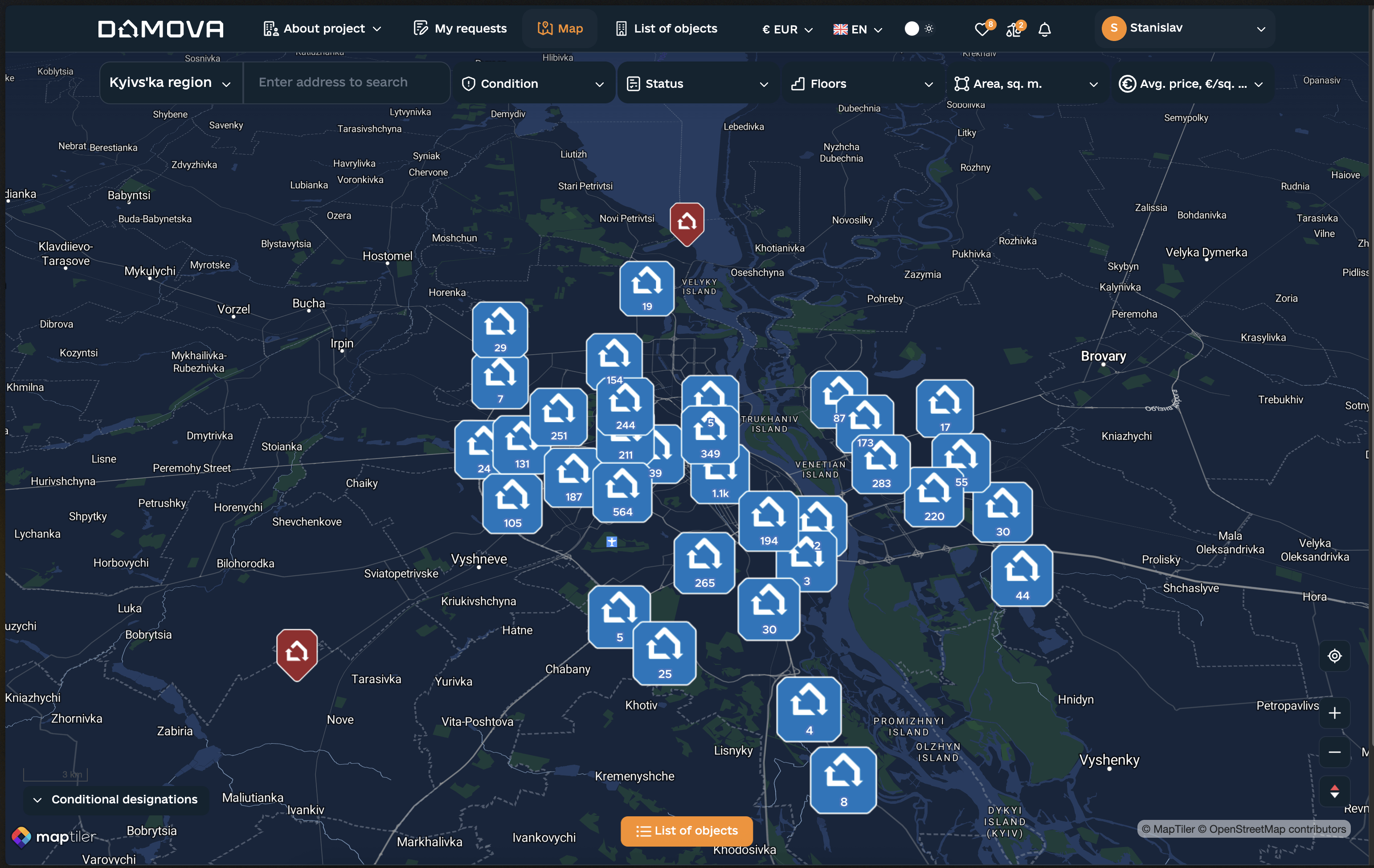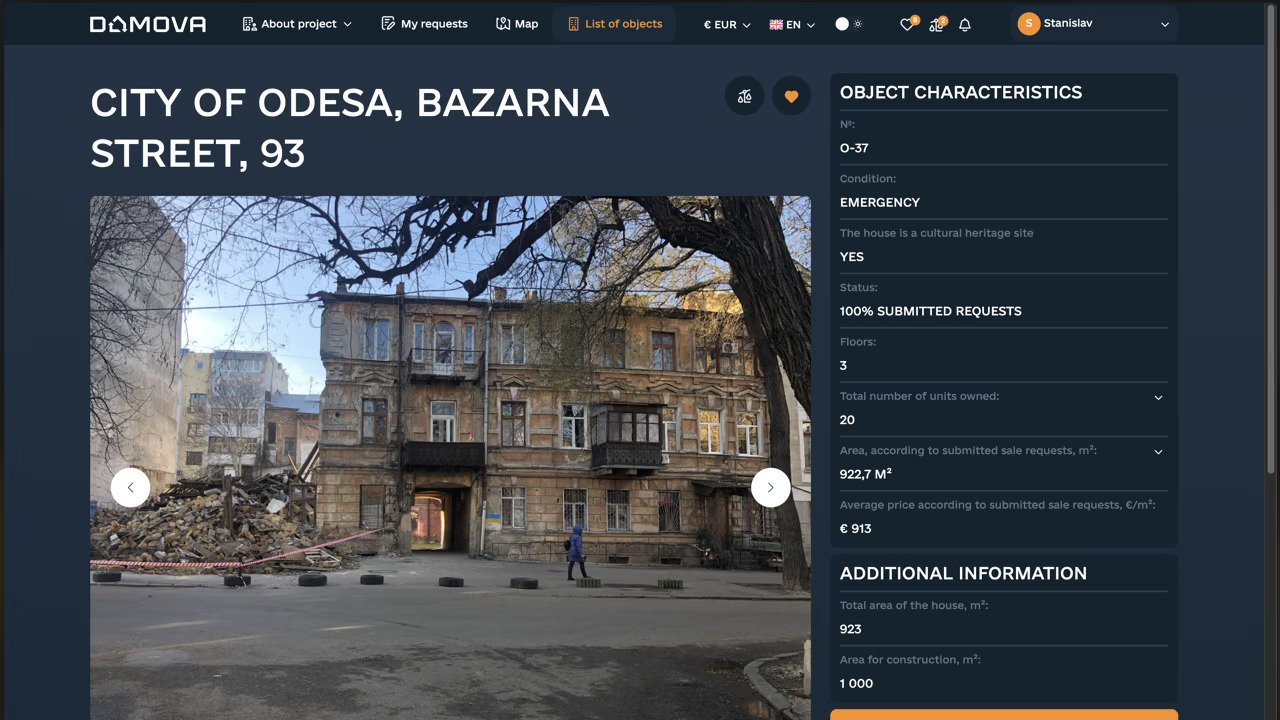There's no shortage of footage of bombed-out and destroyed apartments on the daily news coverage of Russia's invasion of Ukraine. According to research by the Government of Ukraine, the World Bank Group, the European Commission, and the United Nations, about 13 per cent of Ukraine's total housing stock has been damaged or destroyed, affecting more than 2.5 million households.
But how do you sell an apartment that is so damaged it's no longer livable? And is there another apartment to live in? I recently met with Stanislav Soloshenko, Product Manager of DOMOVA în Chișinău, Moldova.
DOMOVA is a unique platform for the profitable sale of dilapidated, emergency and damaged buildings in places like Ukraine.
The platform unites apartment and non-residential property owners of dilapidated or emergency houses to sell the entire building to investors or construction companies jointly.
Ukraine is the bridge to Europe's hidden housing crisis
According to Soloshenko, before Russia invaded Ukraine, there were over 40,000 houses recognised as dilapidated in Ukraine. Now that number is around 250,000.
"So there's a huge market, a need for investment, and a massive problem to solve. That's why we operate in Ukraine."
However, the startup is also active in Moldova and moving into Romania, which is home to plenty of property in need of reconstruction, with interest across Eastern Europe and even parts of Western Europe and the UK.
The startup has developed a digital platform, essentially a free marketplace for sellers. Its revenue comes from investors, who pay for the full buyout process.
"Our value comes from these sellers — we don't charge them. We only charge investors, typically a fee of 10–12 per cent, depending on location and complexity."
DOMOVA unites apartment owners in multi-apartment buildings to enable a joint sale of the entire building to an investor or construction company.
Soloshenko explained:
"Our focus is mainly on ageing housing stock — in Ukraine, that's often dilapidated or even emergency-level uninhabitable. And now, unfortunately, many have also been war-damaged."
The sale of a united house on the DOMOVA platform allows all co-owners to receive their share of the cost of the common public areas, such as the attic and basement, as well as take into account part of the buyer's profit from the construction of a new, larger house on the site of the old one. You can sell a whole block for new construction by combining apartments or several houses.

The result? Homeowners can sell run-down or damaged property more profitably than expected.
By uniting and selling 100 per cent of a building, owners can receive 10–20 per cent above market value.
Soloshenko explained: "That's because developers can reconstruct or expand the building, add floors, or develop surrounding plots. It becomes a more attractive investment.
The appeal of home ownership
Unlike parts of Europe like Germany, Austria, and France, most people in Ukraine and Moldova are homeowners. Property is relatively affordable, so even people on normal salaries can buy.
Real estate in Ukraine remains an attractive investment tool, even in conditions of economic uncertainty. Local laws usually allow reconstruction for purposes other than housing, such as business centres and medical clinics.
Investors register on the platform to access an interactive map showcasing available properties for sale. DOMOVA facilitates the buying process, including financial, architectural, and legal compliance, which it has now largely digitised.

Soloshenko stresses that DOMOVA's goal is not to help people buy properties cheaply but to promote fairness.
He gave an example from his home region of Odesa:
"We had a house damaged by a Russian missile. A section of the building was missing. We united 20 flats, including the destroyed ones. They were all willing to sell as a group.
It worked because there was no free land in that area, so it became a unique investment opportunity."
Global investors are eyeing 40 per cent returns in Ukraine's housing market
Ukrainians themselves aren't investing heavily in the current climate. The startup has partnered with big real estate agencies to promote global investment.
How do international investors factor in the risks that can happen while the war is still ongoing? According to Soloshenko, they often focus on the long-term land opportunity.
"For instance, a building in Odesa might cost €1 million for 20 flats. That's cheap compared to Berlin, where most people can't afford to buy. Our investors have seen 30 to 40 per cent ROI annually.
It's fair for both sides — we don't push locals out."
Homes are not always sold for money, with some owners opting for new apartments over cash.
According to Soloshenko, in Odesa, one family exchanged a damaged 100m² flat for three new flats. "It was a better outcome for them."
Contending with a legacy of mistrust
While there's plenty of properties that are uninhabitable or unsafe to live in, getting people to sell their homes can prove challenging.
Soloshenko admits, "It's difficult. Many don't recognise the severity of their situation or believe there's a solution. Educating them is part of our job.
In a traditionally analogue sector in Ukraine and Moldova, people, especially elderly homeowners, have a lot of distrust when it comes to real estate, especially if they have just the one property they've owned for decades. This distrust is further perpetuated by what Soloshenko calls "a legacy of mistrust, corruption, scams, and pyramid schemes."
"So our challenge is to build trust while offering a commercial solution."
Soloshenko shared, "We've done a lot of research, and honestly, we haven't seen another company doing quite what we do. That's exciting but also challenging. Being first is hard."



Would you like to write the first comment?
Login to post comments